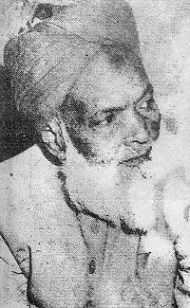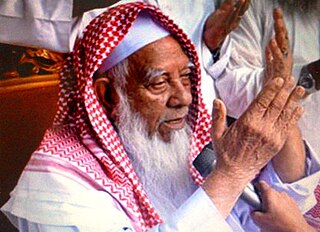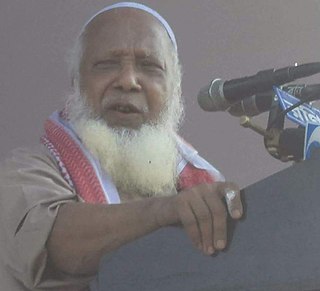
The Deobandi movement or Deobandism is a revivalist movement within Sunni Islam that adheres to the Hanafi school of law. It was formed in the late 19th century around the Darul Uloom Madrassa in Deoband, India, from which the name derives, by Muhammad Qasim Nanautavi, Rashid Ahmad Gangohi, Ashraf Ali Thanwi and Khalil Ahmad Saharanpuri after the Indian Rebellion of 1857–58. They opposed influence of non-Muslim cultures on the Muslims living in South Asia. The movement pioneered education in religious sciences through the Dars-i-Nizami associated with the Lucknow-based ulama of Firangi Mahal with the goal of preserving traditional Islamic teachings from the influx of modernist, secular ideas during British colonial rule. The Deobandi movement's Indian clerical wing, Jamiat Ulema-e-Hind, was founded in 1919 and played a major role in the Indian independence movement through its participation in the Pan-Islamist Khilafat movement and propagation of the doctrine of composite nationalism.
Darul uloom, also spelled dar-ul-ulum, is an Arabic term that literally means "house of knowledge". The term generally means an Islamic seminary or educational institution – similar to or often the same as a madrassa or Islamic school – although a darul uloom often indicates a more advanced level of study. In a darul uloom, Islamic subjects are studied by students, who are known as talaba or ṭālib.
Muhammad Rafi Usmani was a Pakistani Islamic scholar who served as the third president of Darul Uloom Karachi. He was an alumnus of Darul Uloom Deoband, University of the Punjab and the Darul Uloom Karachi. He authored books including Ahkām-e-Zakāt, Al-Tālīqāt al-nāfi'ah alā fath al-mulhim, Islām mai aurat ki hukmrāni and Nawādir al-Fiqh. He was a syndicate member of the University of Karachi, vice-president and a member of the executive council of Wifaq-ul-Madaris. His brother Muhammad Taqi Usmani is also a senior scholar.

Al-Jāmiʿah Al-Islāmiyyah Patiya, better known simply as Patiya Madrasa and formerly known as Al-Madrasah Aḍ-Ḍamīriyyah Qāsim al-ʿUlūm, is a Qawmi Madrasah located in Patiya Upazila of Chittagong District, Bangladesh. It was established in 1938 by Azizul Haq under the direction of Zamiruddin Ahmad. It is also known as an International Islamic University. It has a role in the promotion of Islam in Bangladesh, inclusion of Qawmi Madrasas under one syllabus, providing modern and higher education for scholars.
Qawmi Madrasah is an adjective describing one of the two major madrasah educational categories in Bangladesh. The Qawmi madrasahs are not regulated by the Bangladesh Madrasah Education Board. As private charitable organizations, Qawmi madrasahs are supported almost exclusively by donation.

Muḥammad Shafī‘ ibn Muḥammad Yāsīn ‘Us̱mānī Deobandī, often referred to as Mufti Muhammad Shafi, was a Pakistani Sunni Islamic scholar of the Deobandi school of Islamic thought.

Jamiatul Uloom Al-Islamia Lalkhan Bazar, popularly known as Lalkhan Bazar Madrasa, is a Qawmi madrasah situated in the Lalkhan Bazar area of port city Chittagong. The jamia is founded by Mufti Izharul Islam. His elder son Mufti Harun Izhar is the assistant director of the jamia.

Abdur Rahman Chatgami, also known as Faqihul Millat, was a Bangladeshi Islamic scholar of the Deobandi school. He was born in Imam Nagar, Fatikchhari, Chittagong, in 1920. He was the founder director of the Islamic Research Center Bangladesh, Dhaka.

Shah Ahmad Shafi was a Bangladeshi Sunni Islamic scholar, the chief of Hefazat-e-Islam Bangladesh, Rector of Al-Jamiatul Ahlia Darul Ulum Moinul Islam Hathazari and also the chairman of Bangladesh Qawmi Madrasah Education Board. He was born in 1930 in Rangunia, Chittagong and was educated at Hathazari Madrasah and Darul Uloom Deoband.

Idris Kandhlawi was a Pakistani Sunni scholar during the mid-twentieth century, widely recognized for his contributions to various fields of Islamic studies, including hadith, Quranic studies, Islamic jurisprudence, Prophetic biography, and theology. Holding the titles of Sheikh al-Hadith and Sheikh al-Tafsir, he traced his lineage to Abu Bakr on his father's side and Umar on his mother's side. He studied in Thana Bhawan under Ashraf Ali Thanwi. He studied hadith, first at Mazahir Uloom under Khalil Ahmad Saharanpuri, and later at Darul Uloom Deoband under Anwar Shah Kashmiri. He started his professional career at Madrasa Aminia and later went to Darul Uloom Deoband. In 1929 he took a position in Hyderabad State, where he had access to the Asafia Library. This experience enabled him to produce a five-volume Arabic commentary on Mishkat al-Masabih titled Al-Taleeq al-Sabeeh, of which the first four volumes were published in Damascus. His scholarly work garnered recognition in the Arab world. He later assumed the roles of Sheikh al-Tafsir at Darul Uloom Deoband and Sheikh al-Hadith wa al-Tafsir at Jamia Ashrafia. In addition, he served as the Chancellor of Islamia University of Bahawalpur during its tenure as Jamia Abbasia.
Darul oloom, also spelled darul ulum, dar al-ulum etc., may refer to:

Muḥammad Junaid, popularly known as Junaid Babunagari, was a Bangladeshi Deobandi Islamic scholar, educator, writer, researcher, Islamic speaker and spiritual figure. He was the Amir of Hefazat-e-Islam Bangladesh, Shaykhul Hadith of Darul Uloom Hathazari Madrasa, vice-president of Befaqul Madarisil Arabia Bangladesh, Chairman of Chittagong Noorani Talimul Quran Board and Editor-in-Chief of Monthly Mueenul Islam.
Izharul Islam Chowdhury is the founder of Jamiatul Uloom Al-Islamia Lalkhan Bazar. He is the present executive president of Nizam-e-Islam Party and Nayeb-e-Ameer of Hefazat-e-Islam Bangladesh.
Muhammad Sulṭān Zauq Nadwī is a Bangladeshi Islamic scholar, author and the founder of Jamiah Darul Ma'arif Al-Islamia. Member of the International Union of Muslim Scholars (IUMS). He is known mainly for his expertise in and contribution to Arabic language and literature.

Maulana Abdul Malek Halim is a Bangladeshi Islamic scholar and Nayeb-e Ameer of Hefazat-e-Islam Bangladesh. Abdul Malek Halim is the pioneer of Qawmi Mohila (Female) Madrasa in Bangladesh and the founder of Al-Jamiatul Arabia Lil Baneena Wal Banaat Haildhar, the first Qawmi Madrasa having female branch. At present, Abdul Malek Halim is serving as the principle of the Madrasa. Abdul Malek Halim is also serving as the senior vice-chairman of Islami Oikya Jote. He is an ex-chairman of Nizam-e-Islam Party.

Athar Ali was a Bangladeshi Islamic activist, author, teacher and politician. He participated in the Indian independence movement, and was former president of the Nizam-e-Islam Party. Ali was also a khalifah of Ashraf Ali Thanvi, one of the founders of the Deobandi movement.

Ḥabībullāh Qurayshī was a Bengali Islamic scholar and educationist of the Deobandi movement. He was the founding director-general of Al-Jamiatul Ahlia Darul Ulum Moinul Islam.
Muḥammad Fayḍ Allāh ibn Hidāyat ʿAlī al-Islāmābādī, popularly known as Mufti Faizullah, was a Bangladeshi Deobandi Islamic scholar, mufti, poet, educator and a reformer. He was among early students to study at the Darul Uloom Hathazari. He was an alumnus of Darul Uloom Deoband and later served as the Chief Mufti of the Darul Uloom Hathazari. He established Mekhal Madrasa following in the style of Ashab-e Suffah. He authored over 100 books in Arabic, Persian and Urdu.












